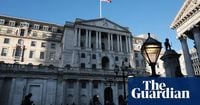The Bank of England is poised to cut interest rates on Thursday, May 8, 2025, as the ongoing trade war initiated by U.S. President Donald Trump continues to impact growth and job security in the UK. With the current key base rate sitting at 4.5%, financial markets are indicating an almost 100% likelihood of a quarter-point reduction. However, some economists are advocating for a more substantial half-point cut to address the challenges posed by the deteriorating global economic landscape.
In a significant move, the Bank's expected intervention comes in response to the shockwaves sent through the world economy following Trump’s “liberation day” tariff policy announcements. As the trade conflict escalates, concerns have mounted regarding its implications for both U.S. and UK economies. Edward Allenby, a UK economist at Oxford Economics, stated, “The near-term UK growth outlook already looked challenging – recent US tariff announcements have added to the headwinds.” This sentiment reflects a broader anxiety among economists regarding the potential for a recession triggered by Trump's aggressive tariff strategies.
Economists have warned that the trade battles led by Trump could precipitate a significant slowdown in international trade. The repercussions are already being felt, with business and consumer confidence levels in Britain declining sharply. This downturn is largely attributed to fears that Trump’s unpredictable tariff policies will hamper economic activity on a global scale.
As the Bank of England prepares for its upcoming rate decision, the U.S. Federal Reserve is also in the spotlight. It is expected to maintain its current interest rates during its meeting on May 7, 2025, despite facing intense criticism from Trump, who previously labeled Fed Chair Jerome Powell a “major loser.”
While there are concerns that Trump’s tariffs could fuel inflation, many economists argue that the border taxes might actually suppress inflation in other countries. This is due to the possibility of goods intended for the U.S. market being redirected elsewhere, resulting in an oversupply in UK and EU markets. The International Monetary Fund (IMF) recently downgraded its growth forecast for the UK to 1.1% for 2025, down from 1.6% in January, highlighting the economic challenges posed by the ongoing trade tensions.
In March, UK inflation fell unexpectedly to 2.6%, but analysts predict it could rise again, reaching a peak of 3.7% this summer, nearly double the Bank’s target of 2%. Despite this potential spike in inflation, the current economic climate has led many to believe that the Bank of England should take decisive action to cut borrowing costs.
Andrew Bailey, the Bank’s governor, expressed concerns at last month’s IMF meetings in Washington, warning that the UK economy is facing a “growth shock” as a direct result of Trump’s policies. Analysts at Morgan Stanley have suggested that a half-point cut would be a “risk” to their projections for consecutive quarter-point reductions, which they anticipate will bring rates down to 3.25% by the end of the year.
As the date for the Bank’s decision approaches, the pressure mounts on policymakers to respond to the economic fallout from Trump’s trade war. The potential for a significant interest rate cut reflects a growing recognition of the need for urgent action to bolster the UK economy amidst a backdrop of uncertainty and instability.
With the global economic landscape shifting rapidly and trade tensions showing no signs of abating, the Bank of England’s forthcoming decision will be closely watched by economists, businesses, and consumers alike. The hope is that a proactive approach in adjusting interest rates could help mitigate some of the adverse effects stemming from the ongoing trade conflict, providing much-needed relief to households and businesses across the UK.
In summary, as the Bank of England gears up for its crucial interest rate decision, the implications of Trump’s trade war loom large. The expected rate cut is a reflection of the growing concerns over economic stability, and the move could signal a shift in monetary policy aimed at safeguarding the UK economy from further shocks.




